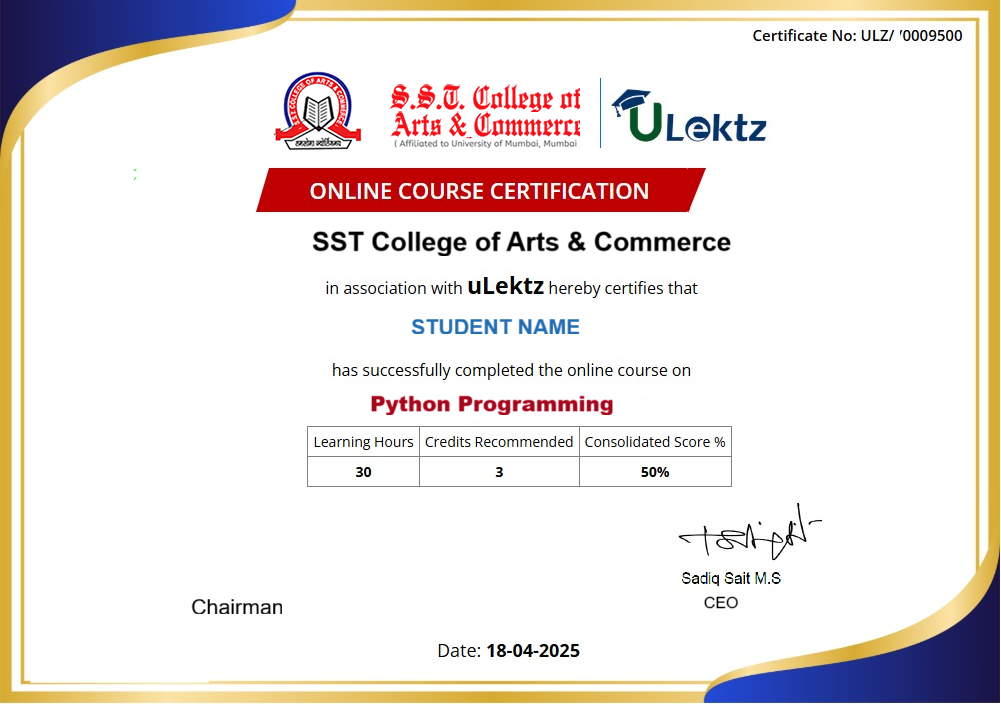

Note: Please check your Spam or Junk folder, in case you didn't receive the email with verification code.
Non-Linear: Random Order
Equip students with technical knowledge to protect and defend against cyber threats.
Develop skills to plan, implement, and monitor cyber security mechanisms.
create responsible digital citizens who contribute to a healthy cyber security ecosystem.
Understanding of Cyber Security Concepts: Grasp the basics of cyber security, including threat landscapes, cyber crimes, and remedial measures.
Technical Proficiency: Gain skills in scripting, network security, operating systems, and database security.
Practical Application: Apply security concepts in real-world scenarios, including ethical hacking and vulnerability assessments.
Technical Skills: Scripting (Python, PowerShell), network security, operating system security, and database security.
Analytical Skills: Identifying vulnerabilities, analyzing threats, and implementing security measures.
Problem-Solving Skills: Developing solutions to security breaches and preventing future attacks.
Communication Skills: Reporting cyber crimes, collaborating with teams, and explaining security protocols to non-technical stakeholders.
Cyber Security Analyst: Assess vulnerabilities and respond to security incidents.
Ethical Hacker: Identify and mitigate security vulnerabilities in systems.
Security Consultant: Advise organizations on best practices and security measures.
Incident Responder: Respond to and manage security breaches and incidents.
Security Manager: Oversee and manage an organization's security policies and procedures.
 Overview of cyber security landscape
Overview of cyber security landscape
 CIA triad confidentiality integrity and availability
CIA triad confidentiality integrity and availability
 Types of cyber threats and attack vectors
Types of cyber threats and attack vectors
 Cyber Security
Duration:
Cyber Security
Duration:
 Unit Test
10 Questions
Unit Test
10 Questions
 Network protocols and vulnerabilities
Network protocols and vulnerabilities
 Firewalls and intrusion detectionprevention systems
Firewalls and intrusion detectionprevention systems
 Virtual Private Networks (VPNs)
Virtual Private Networks (VPNs)
 Wireless network security
Wireless network security
 Ref: Network security fundamentals
Duration:
Ref: Network security fundamentals
Duration:
 Unit2 Test
10 Questions
Unit2 Test
10 Questions
 Operating System Security
Operating System Security
 Endpoint protection
Endpoint protection
 Patch management and system hardening
Patch management and system hardening
 Virtualization and cloud security basics
Virtualization and cloud security basics
 Virtualization and cloud security basics
Duration:
Virtualization and cloud security basics
Duration:
 Unit3
10 Questions
Unit3
10 Questions
 Symmetric and asymmetric encryption
Symmetric and asymmetric encryption
 Hash functions and digital signatures
Hash functions and digital signatures
 Public Key Infrastructure (PKI)
Public Key Infrastructure (PKI)
 SSLTLS and secure communication
SSLTLS and secure communication
 Ref:Cryptography an Introduction
Duration:
Ref:Cryptography an Introduction
Duration:
 Unit4 Test
10 Questions
Unit4 Test
10 Questions
 Access Control and Authentication
Access Control and Authentication
 Multi-factor authentication
Multi-factor authentication
 Access control models (DAC MAC RBAC)
Access control models (DAC MAC RBAC)
 Single Sign-On (SSO) and federation
Single Sign-On (SSO) and federation
 Acess control models
Duration:
Acess control models
Duration:
 Unit5 Test
10 Questions
Unit5 Test
10 Questions
 OWASP Top 10 vulnerabilities
OWASP Top 10 vulnerabilities
 Cross-Site Scripting (XSS) and SQL injection
Cross-Site Scripting (XSS) and SQL injection
 Security headers and secure cookies
Security headers and secure cookies
 Web Application Firewall
Web Application Firewall
 Ref: Web application Security
Duration:
Ref: Web application Security
Duration:
 Unit6 Test
10 Questions
Unit6 Test
10 Questions
 Malware Analysis
Malware Analysis
 Malware detection and analysis techniques
Malware detection and analysis techniques
 Anti-malware strategies and tools
Anti-malware strategies and tools
 Malware Analysis
Duration:
Malware Analysis
Duration:
 Unit7 Test
10 Questions
Unit7 Test
10 Questions
 Security Information & Event Management (SIEM)
Security Information & Event Management (SIEM)
 Incident detection and triage
Incident detection and triage
 Incident response planning and execution
Incident response planning and execution
 Digital forensics basics
Digital forensics basics
 Security management, GRC
Duration:
Security management, GRC
Duration:
 Unit8 Test
10 Questions
Unit8 Test
10 Questions
 Risk assessment methodologies
Risk assessment methodologies
 Developing security policies and procedures
Developing security policies and procedures
 Business continuity and disaster recovery planning
Business continuity and disaster recovery planning
 Compliance and regulatory requirements (e.g GDPR HIPAA)
Compliance and regulatory requirements (e.g GDPR HIPAA)
 Ref: Assessment of Risk
Duration:
Ref: Assessment of Risk
Duration:
 Unit9 Test
10 Questions
Unit9 Test
10 Questions
 Secure coding practices
Secure coding practices
 Software Development Life Cycle (SDLC) security
Software Development Life Cycle (SDLC) security
 Code review and static analysis tools
Code review and static analysis tools
 DevSecOps principles
DevSecOps principles
 Secure coding practices
Duration:
Secure coding practices
Duration:
 Unit10 Test
10 Questions
Unit10 Test
10 Questions
 Mobile device management
Mobile device management
 App security and OWASP Mobile Top 10
App security and OWASP Mobile Top 10
 IoT security challenges and best practices
IoT security challenges and best practices
 Securing smart home and industrial IoT devices
Securing smart home and industrial IoT devices
 Ref:IoT security
Duration:
Ref:IoT security
Duration:
 Unit11 Test
10 Questions
Unit11 Test
10 Questions
 Cloud service models and their security implications
Cloud service models and their security implications
 Shared responsibility model
Shared responsibility model
 Cloud-specific threats and mitigation strategies
Cloud-specific threats and mitigation strategies
 Cloud security best practices and tools
Cloud security best practices and tools
 Ref: Foundation of Privacy
Duration:
Ref: Foundation of Privacy
Duration:
 Unit12 Test
10 Questions
Unit12 Test
10 Questions
 Ethical hacking methodology
Ethical hacking methodology
 Reconnaissance and scanning techniques
Reconnaissance and scanning techniques
 Exploitation and post-exploitation
Exploitation and post-exploitation
 Reporting and remediation
Reporting and remediation
 Ref: Ethical Hacking
Duration:
Ref: Ethical Hacking
Duration:
 Unit13 Test
10 Questions
Unit13 Test
10 Questions
 Artificial Intelligence and Machine Learning in
Artificial Intelligence and Machine Learning in
 Blockchain and its security implications
Blockchain and its security implications
 Quantum computing and post-quantum cryptography
Quantum computing and post-quantum cryptography
 Zero Trust security model
Zero Trust security model
 Ref: Web Application Vulnerability Scanning
Duration:
Ref: Web Application Vulnerability Scanning
Duration:
 Unit14 Test
10 Questions
Unit14 Test
10 Questions
 Cybercrime and cyber law basics
Cybercrime and cyber law basics
 Ethical considerations in security research
Ethical considerations in security research
 Privacy regulations and data protection
Privacy regulations and data protection
 Professional ethics for security practitioners
Professional ethics for security practitioners
 Ref:Ethical Hacking
Duration:
Ref:Ethical Hacking
Duration:
 Unit15 Test
10 Questions
Unit15 Test
10 Questions
 Final Test
20 Questions
Final Test
20 Questions
The certificate issued for the Course will have
Only the e-certificate will be made available. No Hard copies. The certificates issued by SST College of Arts and Commerce Mumbai. can be e-verifiable at www.ulektzskills.com/verify.



 40 hours Learning Content
40 hours Learning Content 100% online Courses
100% online Courses English Language
English Language Certifications
Certifications